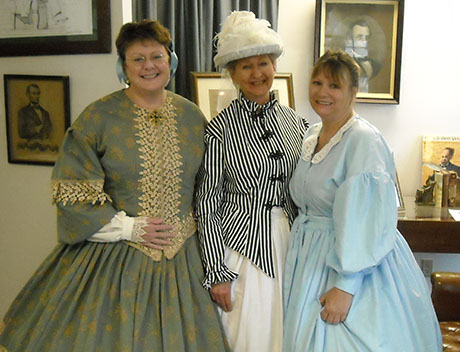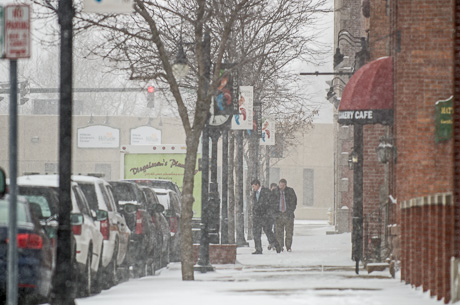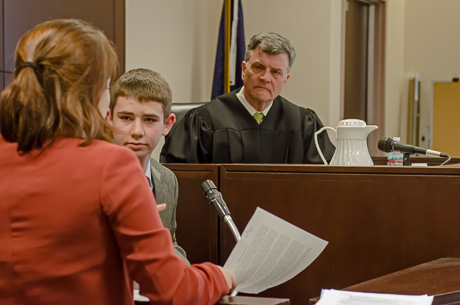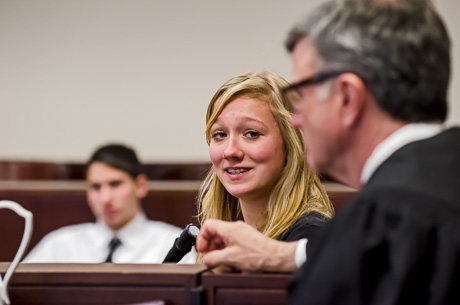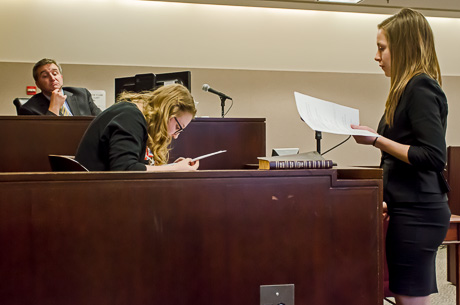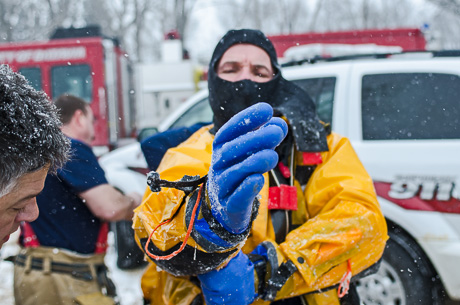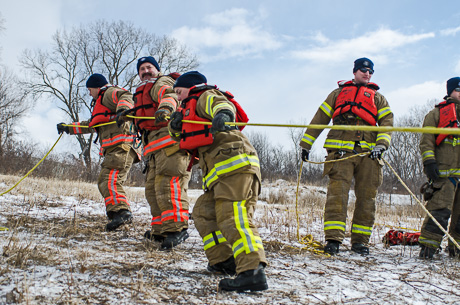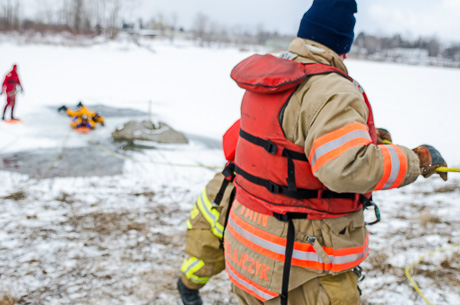Shane M. Bell
The first thing District Attorney Lawrence Friedman told the jurors when he stepped up to offer his closing arguments in the Shane Bell felony assault case is that there is at least one thing he and defense attorney William Tedford agree on.
And that is what the jurors must decide during their deliberations, which started this afternoon.
First, did Shane Bell cause serious physical injury to Scott Baker the night of Aug. 25 outside The Harvester bar on Harvester Avenue, Batavia. Second, did Bell intend to cause serious physical injury to Baker. Three, was Bell justified in hitting Baker because he felt Baker posed a threat.
And that is pretty much all Tedford and Friedman agree on. Their closing arguments offered up differing interpretations on every aspect of the case.
On the question of the seriousness of the injuries, Tedford questioned whether it was Bell's punch that caused Baker to go into a coma.
He said Dr. Gregory T. Bennett testified that he "couldn't tell you which injury caused the coma. Was it the back of the head, the front? He couldn't tell you for sure if it was both. That, ladies and gentleman is reasonable doubt."
Friedman took a different view, first citing the anticipated jury instructions that the law would require them to find that Bell's actions were a contributory cause, an action that forged a link, brought about the injury or set in motion a chain of events that caused the injury.
A defense witness, Friedman noted, Curtis Gallagher, said that Bell threw a strong, straight jab with a follow through. Recorded evidence presented at trial showed Bell offering contradictory statements about how he hit Baker. Sometimes he said he used a fist, sometimes he said it was an open-handed slap.
Baker suffered a facial fracture and broken nose.
When he was hit, according to the testimony of both Gallagher and his girlfriend, Joslyn Hyland, who was called by the prosecution, he fell straight back, straight as a board, hitting his head on the pavement.
The straight, hard jab is more likely the truth of how Bell hit Baker, Friedman said.
"He hit him hard enough to cause serious, traumatic brain injury," Friedman said.
The only intent Shane Bell had the night of Aug. 25, Tedford said, was to find his keys and leave the Harvester.
He had seen Baker dancing with his girlfriend, and told police it didn't bother him. Baker had tried to pick a fight with him, Tedford said, and Bell ignored him. Baker threatened him, Tedford said, and Bell did nothing.
"Baker threatens him first," Tedford said. "He became the initial aggressor."
It was only after all of this, when Bell was trying to leave, and Baker followed him across the street and grabbed him, did Bell turn and hit Baker.
Tedford recounted a statement Bell made to police.
"I don't know what Scott Baker is going to do. I don't know him that well. I just wanted to get out of there. I didn't mean to knock him out. I hope he's OK."
Bell's actions after he hit Baker, Tedford said, shows a man with no intent to seriously injure anybody. Bell, he said, moved Baker out of harm's way, out of the darkened roadway, and onto grass. He tried to revive him. He was nothing but cooperative with police.
"It was Scott Baker's choice to go across the street," Tedford said. "Per what Mr. Friedman told you during jury selection, people should be accountable and responsible for their own choices."
Witnesses said Bell told Baker, "You better be coming over here to smoke a bowl with me or you're going to get knocked out."
That wasn't a threat, Tedford said, it's the way the kind of people who frequent The Harvester would try to defuse a situation.
"That is a warning to the initial aggressor," Tedford said. "If you continue to put me in this situation, if you continue to threaten me, if you continue to follow me across the street, I'm going to be left with no other alternative except to defend myself."
Friedman had a very different take on the statement.
That statement was made twice, Friedman said. First, as an invitation to actually smoke some marijuana and then followed by the threat of hitting Baker if he had any other intention than smoking a bowl.
"It was an attempt to lure Baker across the street, away from the people who were with him in order to knock him out," Friedman said.
Friedman took issue with the defense contention that Baker posed a threat to Bell.
"They portray him as a bumbling drunk at the same time they want you to believe that this same Scott Baker posed a serious threat to Shane Bell that night," Freidman said.
Friedman recalled statements by Bell to police such as, "I wasn't in a mood to play," and about his experience with kickboxing and that he's "f--'d people up" in the past.
"When the defendant punched Scott Baker the way he did, he knew the nature of the consequences of that punch, and that exactly what he knew would happen did happen," Friedman said. "Scott Baker suffered a serious physical injury just as the defendant intended."
All of the evidence, Tedford said, points to his client being justified in hitting Baker. Baker had taunted him, threatened him, danced with his wife and tried to follow him to his car.
Once that evidence has been established, Tedford said, it's up to the prosecution to prove a self-defense justification doesn't exist, and Tedford said he didn't believe the people had made that case.
If Baker threatened Bell, Friedman said, why did Bell not once mention the threats to police during the taped interviews.
"He never once said he heard Scott Baker say a word about a knife," Friedman said. "He never said he heard Scott Baker say anything about murdering him, stabbing him, kicking his ass. Don't you think that's one thing, if he was thinking about saving his own skin, he would have told police?"
If he didn't hear those threats, Friedman said, then how are they relevant to a self-defense claim? If he did hear them and didn't mention them, then he must have taken them as empty threats, not as something he felt he needed to defend himself against.
"I would submit to you that by the defendant's own words you hear on those recordings, he clearly was not afraid of Scott Baker," Friedman said.
The defense, Friedman said, contends that Baker could have walked away, well, so could have Shane Bell. But he didn't. If he felt threatened, he could have called the police. But he didn't.
"Of course he didn't, because there was no real threat," Friedman said.
Bell was angry, Friedman said. He was angry because he couldn't find his keys. He was angry because Baker had danced with his girlfriend. He was angry because his girlfriend had left. And he took it out on Baker, Friedman said.
"Baker is the person who suffered the consequences of the defendant's pent-up anger," Friedman said.
He was still angry, Friedman said, when he saw Gallagher and Hyland sitting in a nearby truck and he walked up to them and said, "Someone took my keys. They are f--king with me. You didn't see shit."
That, Friedman said, was the statement of a man with a guilty conscious, who knew he had done wrong, who knew he had intentionally hit another person hard enough to knock him out.
"He knew he was wrong. He knew he wasn't justified. He knew he didn't want any witnesses."
The case is now in the hands of the jury.
Previously:
